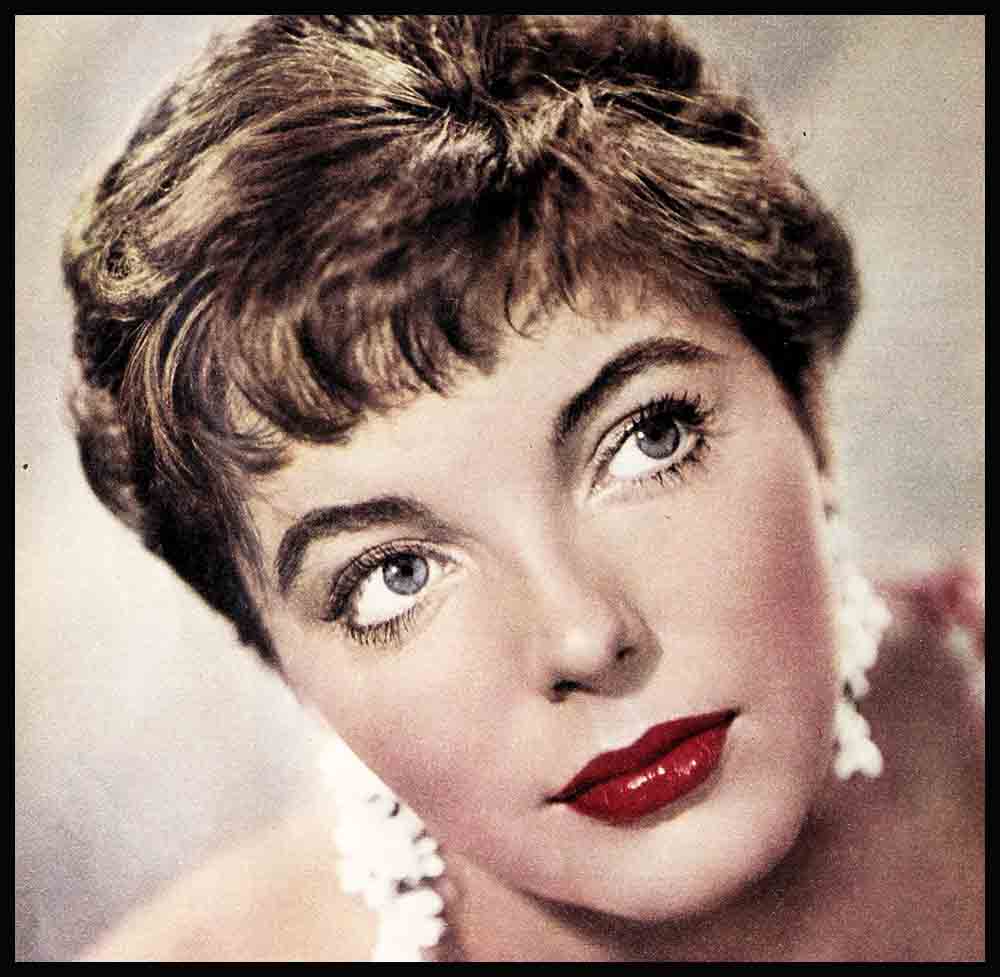
My Daughter, Joan
We were waiting for a cab, the slender, dark-haired girl and I. Her large eyes looked at me reproachfully and her voice was an anguished wail, “Do you really want me to go on being a juvenile delinquent, Mummy? Because I’ll do it if you want me to.”
My daughter Joan had no idea how the question sounded until it had been said—in Joan’s vibrant, dramatic and far-carrying voice. When realization dawned, she gave a little gasp, then began to giggle. I turned around to find every single soul in the vicinity glaring at me as if I were intent on pushing my child into a life of crime. I disappeared as quickly as possible into a taxi, Joan climbing in after me. As the cab pulled away from the indignantly staring people on the street, Joan and I looked at each other and then collapsed in helpless laughter.
What we’d been discussing was her career. Joan, under contract to J. Arthur Rank at the time, had been cast as a delinquent in film after film. She was terribly worried about being typed and wanted to ask to be released from her contract, whereas I had been suggesting that she wait a while.
The incident seems to me one of the more perfect examples of something I’ve been contending for years—that life with Joan could never, under any circumstances, be dull and plodding. Even when the circumstances include a shopping expedition.
Joan’s father and I raised our daughter to be the sweet and lovely young lady that she is. It’s just that somewhere along the way she developed an absolute genius for the unexpected. For instance, how many parents receive letters like this one? Dear Mummy and Daddy, Sorry for not writing sooner, and this is just to say that all’s well. Will get off a long letter within a couple of days, but right now I’m exhausted. Spent the dreariest day in the bathtub, wearing long underwear! Love, Joan.

Unusual? We rather thought so. But then, so was the story she related later. It seems she’d started the famed bathtub sequence for “The Opposite Sex” in a bathing suit, but the scene was a long one and took time to shoot. After three days in the tub, the suit was cutting her to ribbons and her skin was a combination of shades of black, blue and scarlet. The studio called in a doctor, who took one look at her and announced, “No more water.”
Consequently, on the fourth day Joan donned men’s underwear, plus a pair of plastic trousers. They placed a wooden board in the tub, a plastic sheet around Joan’s waist, then poured in water and soapflakes to give a bubblebath effect at the top. In this way she was able to finish the scene, but she waited to write us the full details until she was able to laugh about them!
If you’re thinking that something like this might occur only in the life of a movie star, perhaps you’re right. But although most of the things that happen to Joan could happen to anyone, they rarely do. I can vividly recall her account of a swim in Jamaica while on location for “Seawife.” While paddling around, she glimpsed two large green things shimmering in the water and swam closer to investigate. Fascinated, she called to some friends swimming near by, “Look! Come see what I’ve found!”
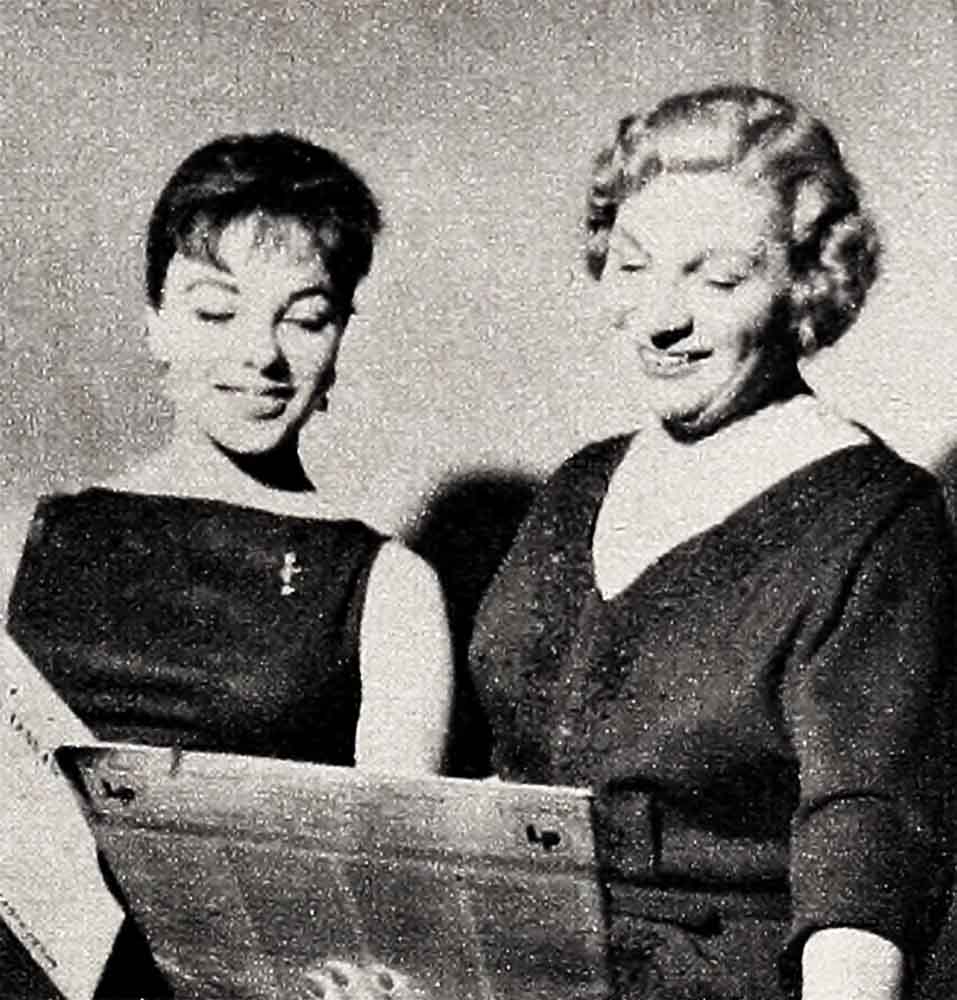
They came, saw, and left abruptly, taking my bewildered daughter with them. Once safely away, they explained that she’d been rubbing noses with an octopus. The green things were the eyes.
Her friends have found that when they’re with Joan, it’s best to be prepared for anything. As her mother, I first became aware of the fact in a department store one day when she was three. A floor full of fellow shoppers began to scream with laughter and I glanced around to find the source of amusement. Her name was Miss Collins and she was as busy as could be taking hats off the stands, trying them on, and mimicking the models perfectly.
As you may be gathering, life with Joan is full of surprises. But even when she’s predictable the atmosphere is a lively one. In addition to her way with words, our daughter somehow acquired a supply of energy that could put the vitamin-pill industry out of business. With all of the titles she was awarded during her modeling and starlet days, her father and I have often wondered how she missed out on “Miss Perpetual Motion.”
When she is sitting down, her fingers tap the arm of the chair, her toes tap the floor. She is constantly reaching for a cigarette. I’d worry about her smoking too much, but her average is approximately two puffs per cigarette and then she puts it out.
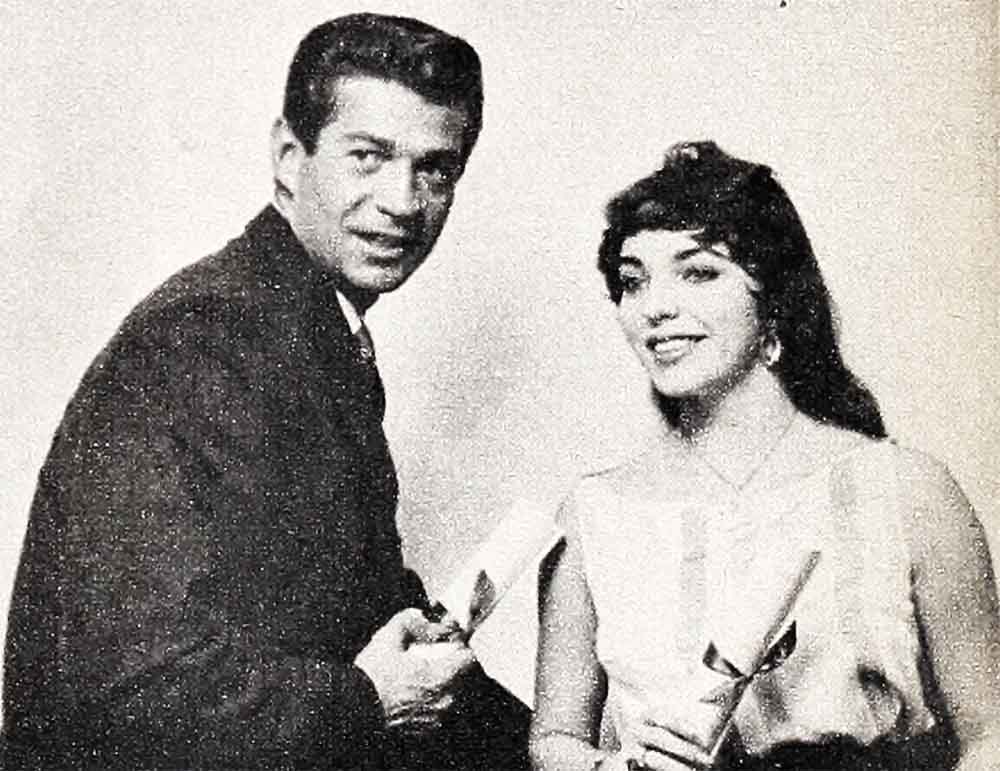
When she’s home, the record player goes from morning to night, with Joan joining the original Broadway casts in songs from her two favorite albums, “Pajama Game” and “Damn Yankees.” I’ve come to know the scores by heart, although I’ve never seen the shows.
A full house at the Collinses’ is a thing to behold, providing you have the strength. There’s our ten-year-old son, Bill, who likes to retire to his room with the television set going full blast. There’s Jackie, eighteen, who prefers the radio in her room—usually turned up so that she can hear it if she suddenly decides to step into the kitchen. Add Joan, the record player and the telephone and you have something that closely resembles bedlam.
I mention the telephone because it happens to be Joan’s lifeline. It rings constantly when she’s home. We used to have two of them. However, the extension was taken out when we discovered that Jackie, at an early age, was developing remarkably as a mindreader. Joan would be dressing to go out and I’d ask the name of her escort. Jackie, then too young to date and resenting it mightily, took the greatest pleasure in supplying full details including name, time, occasion, and conversation.
Of course, we occasionally doubt the wisdom of having settled for the kind of telephone that can be plugged into any room. Now when it rings, there’s an eight-room search, with everyone shouting, “Who talked last—and where?”
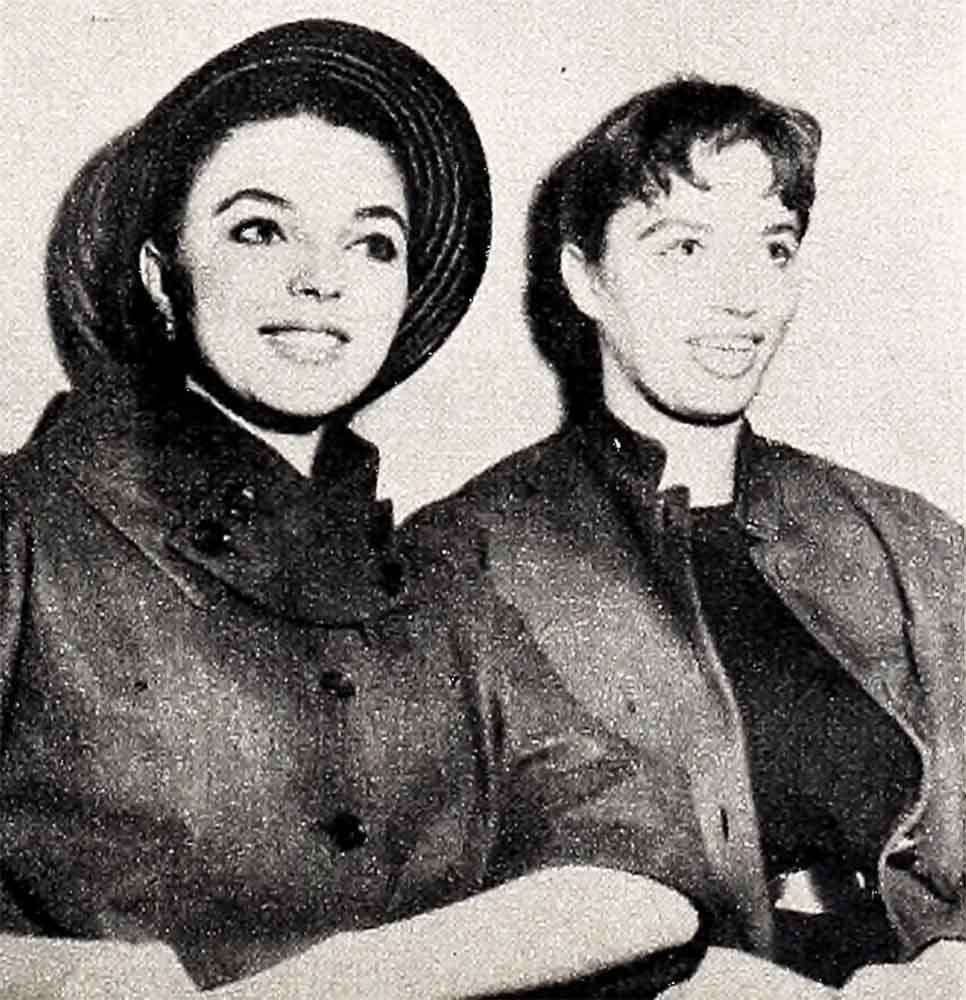
Although Joan is on the telephone or on the run from the moment she gets up in the morning until she climbs into bed at night, I’m delighted that she has learned to channel her energy as far as her work is concerned. When she’s in a picture, that’s it. And we can count on it.
When her father visited Hollywood last year, his plane was scheduled to arrive in California at two a.m. He landed to find the greeting committee conspicuously absent. He was less than surprised at the note from Joan which awaited him. “I’m so sorry I can’t meet you, Daddy,” it read. “But I have to be at the studio at six-thirty this morning. Will call you from the set.”
Joan’s dates are aware of her shooting schedules. During her father’s stay, he would pick her up at the studio at six or seven in the evening and drive her home, where she’d bathe and dress. Then Arthur Loew, Jr., would stop by and the three of them would go on to dinner. However, by ten o’clock, eleven at the latest, Joan was home again.
The majority of Joan’s dates in Hollywood have been with Arthur, and she and her father tell me that he’s an awfully nice young man. Whether he and Joan will marry—well, her career has separated them a great deal during recent months and the future is hard to predict. But I’m certain of one thing: This time Joan will be ready for marriage. Our daughter has matured considerably in her attitude toward matrimony. “I want to get married again, Mummy,” she told me the last time she was home. “But this time I’m going to be really sure that he’s the right person.”
She sighed a little. “People who marry after knowing each other for just four months only think they’re in love. They don’t really know each other at all.”
I wish that we could have spared Joan the heartbreak of learning the hard way, from her mistake. Joan was never a flirt. Maxwell Reed was her first love. For a while, he was her secret love. She’d casually ask if I would take her to see his films. By the time we’d seen one of them three times, I suspected that there was a crush involved. Then his picture appeared in her locker at school, and another beside her bed.
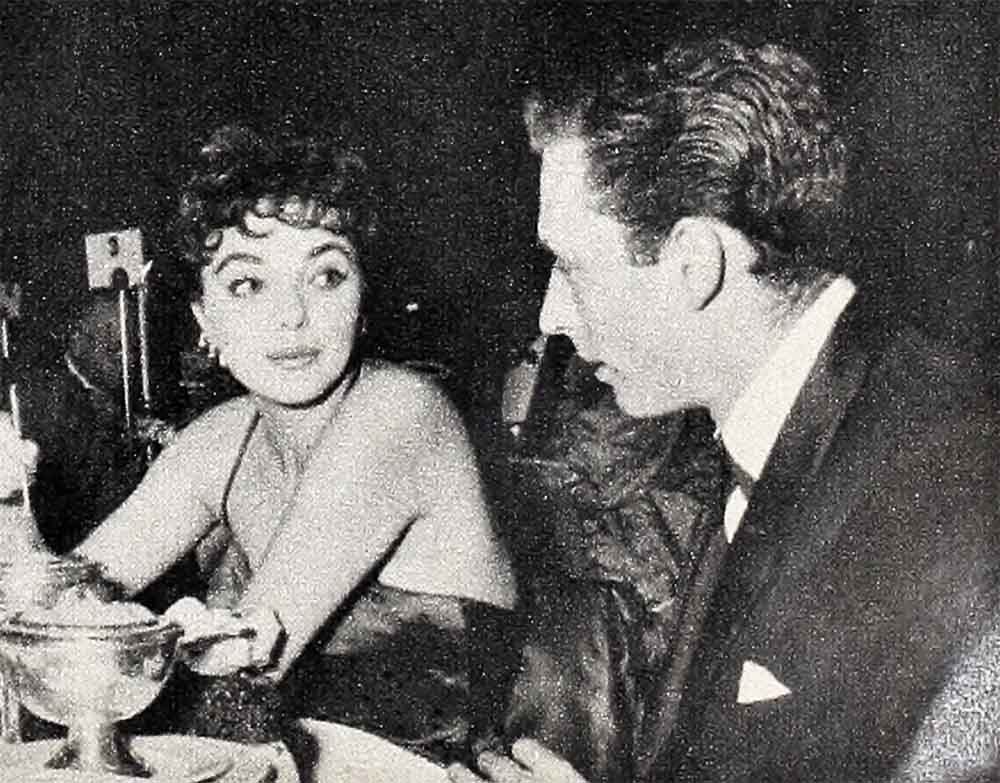
She met Max the night she went to a party with Laurence Harvey. They had dated only a few months when she told us that they wanted to marry. Her father and I objected vigorously. They’d met such a short time before, and Joan was only eighteen, entirely too young to take on the responsibilities of marriage.
The discussion went on for days and I was the first to give in. I knew that if we didn’t give our permission, they would most certainly elope, and I felt, as all mothers feel, that a girl’s family must be with her on her wedding day, that the wedding should be a happy, memorable occasion. Other girls become brides in their teens and make their marriages successful, I reasoned. Perhaps Joan and Max would stand a chance, after all.
But Joan’s father was adamant. “If you marry that man I shall never speak to you again,” he stormed one night, after reasoning had failed. Then he stalked out.
When he returned, several hours later, Joan was still in tears. He sat down beside her and put his arm around her. “all right,” he said. “all right.”
The wedding took place on Joan’s nineteenth birthday, At first everything went well. They set up housekeeping in a penthouse apartment and Joan tried her hand at cooking. They bought a boat and spent their weekends sailing. They had their careers in common and starred in several plays together. But they couldn’t overcome their differences, and two years later the marriage was over. “You were right,” Joan told her father. “I should have listened to you.”
“Why does this have to be the one time in my life that I’ve been able to say, ‘I told you so’?” her father replied unhappily.
“My next marriage will take a lot of thought on my part,” Joan says today. However, whomever she marries will have to contend with the fact that she will probably never be domestic. When her father returned from California, I inquired, “How’s she coming with the housekeeping?”
“The maid is doing a beautiful job,” he smiled.
It’s true that there has always been someone to do things for Joan. It’s also true that some people are domestically inclined, others aren’t. And Joan did not inherit my love for housework and cooking!
I can so plainly recall the times we were without help during the war. I’d ask her to do this or that in the kitchen and in her dramatic way she’d counter, “You know, Mummy, you chose to be a housewife. I didn’t. You chose your career. I have chosen mine.”
I couldn’t very well argue and actually never had to. After she’d made her point she was quite cheerful about taking over the duties that I assigned her.
The principal thought in Joan’s mind, however, was to become an actress. We should have been prepared for it, as she comes from a long line of show people. Her grandparents were theatrical folk and her father began his career in 1917. His father ran a company in South Africa and as a boy it was Will’s job to go around and nail handbills on the trees.
Oddly enough, it was because of Will’s life in show business that he objected to the idea of Joan getting into it. As a theatrical agent in London, he’s always been too well aware of the hardships and heartbreaks involved.
Joan persisted and finally asked if she could take the examination for the Royal Academy of Dramatic Arts. I was pretty well floored to hear him agree immediately. When we were alone, I politely asked him if he’d lost his mind. “Of course not,” said my husband. “I think it’s a fine idea.”
“Will Collins . . . after all the years you’ve been objecting!”
“Don’t you see,” he explained with the air of a man of logic. “This will be the finish. Let her take the exam. She’ll never pass it. It will be the end of it.”
There was reason for his optimism. Of the five hundred who apply to the Academy each year, only a small percentage can be accepted.
To bolster Joan’s morale and help to soften the blow that I was certain would come, I took our daughter shopping for a special dress. It was white, with blue polka dots, and Joan went to the audition feeling as if she had stepped out of Vogue. She chose to do a scene from “Our Town” and a speech from Shaw’s “Cleopatra.” Then she came home for the long wait.
Several weeks later. she received a letter of acceptance. She’d passed the test with flying colors, and I might add that when the news arrived there was no prouder man in the whole of the British Isles than one Will Collins. As a matter of fact, his attitude has yet to change. Today he’s official keeper of the scrapbooks and he’ll bring out ten of them at the drop of a hint.
Of course, our daughter has changed in some ways since she’s been in California, in little ways that I suppose only a mother would notice. There’s her habit of leaving half her meal, no matter what I serve her. It’s a brand-new habit and it worries me a bit. There’s the sweater she wears, which swallows her. “I bought it for Arthur, but he didn’t care for it,” said my daughter, whose clothes usually cling to her figure. “I couldn’t let such a nice sweater go to waste, could I?” There’s her jewelry. “It’s real now,” she glows. “I stored the costume stuff.”
In other ways, Joan has changed very little. Star that she is, she can still join her brother in his Davy Crockett games, keep a protective eye on her younger sister, Jackie, who’s now in Hollywood. Friends from her Academy days are still close friends. And when she’s home, no matter which room I’m in, I can still hear her little-girl-like call, “M-u-m-m-y. . . .”
She’s as outspoken as ever, and she shudders to think that the trait might have cost her the role of the nun in “Seawife,” if she’d persisted. She was in New York when the studio called to tell her that she’d been chosen for the part, only then they were calling it “Seawyf and Biscuit.” Joan began to object. “It sounds,” she told them, “like the story of a boat and a dog.”
Actually, it’s a tale of five survivors of a shipwreck and it’s a magnificent opportunity for her. But as parents, her father and I were especially delighted that some of the film could be shot in London because it meant that she could be at home with us for a while.
I believe I was reminded most of the old days the night she appeared, ready for a premiere, in an extremely tight-fitting formal gown. “I wonder what would happen if I start breathing,” she grinned.
We soon found out. The zipper went. I was taking some hasty stitches when her escort arrived. “Hurry, Mummy. It’ll be all right,” were her famous last words.
Joan returned home unusually early that evening, wearing her coat and clutching it with both hands. “What happened?” I asked her.
“It was a very funny film,” was my daughter’s reply. “I laughed and my dress began falling off.” Then she let go of the coat and her gown fell to the floor.
It was hectic, but all too brief a visit. Just now Joan is on the “Island in the Sun” location in Jamaica. Consequently, it’s a quiet evening as I write this. Bill’s in bed and the television set has been turned off. The records are back in their albums and there’s no dark-haired girl to laugh into the telephone while her father roars, “It’s bedlam. Absolute bedlam!”
However, earlier this evening the same Mr. Collins looked up from his paper and remarked, “Peaceful, isn’t it? Nearly drives you crazy, doesn’t it, all this peace and quiet?”
It does. But tomorrow there should be a letter and that will help. In the meantime, I think I’ll join the original Broadway cast in a chorus from “Pajama Game.”
THE END
It is a quote. PHOTOPLAY MAGAZINE JANUARY 1957


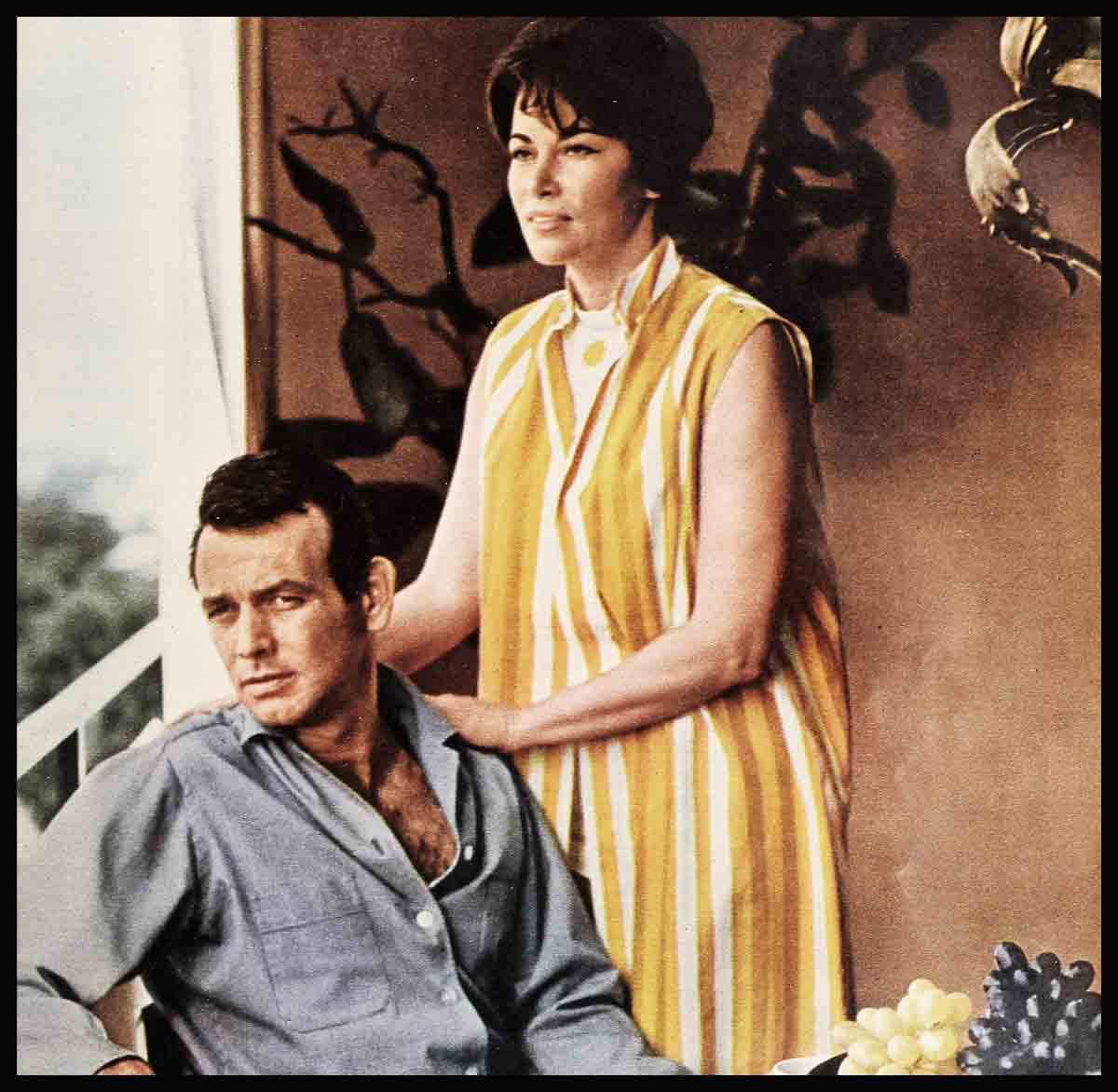

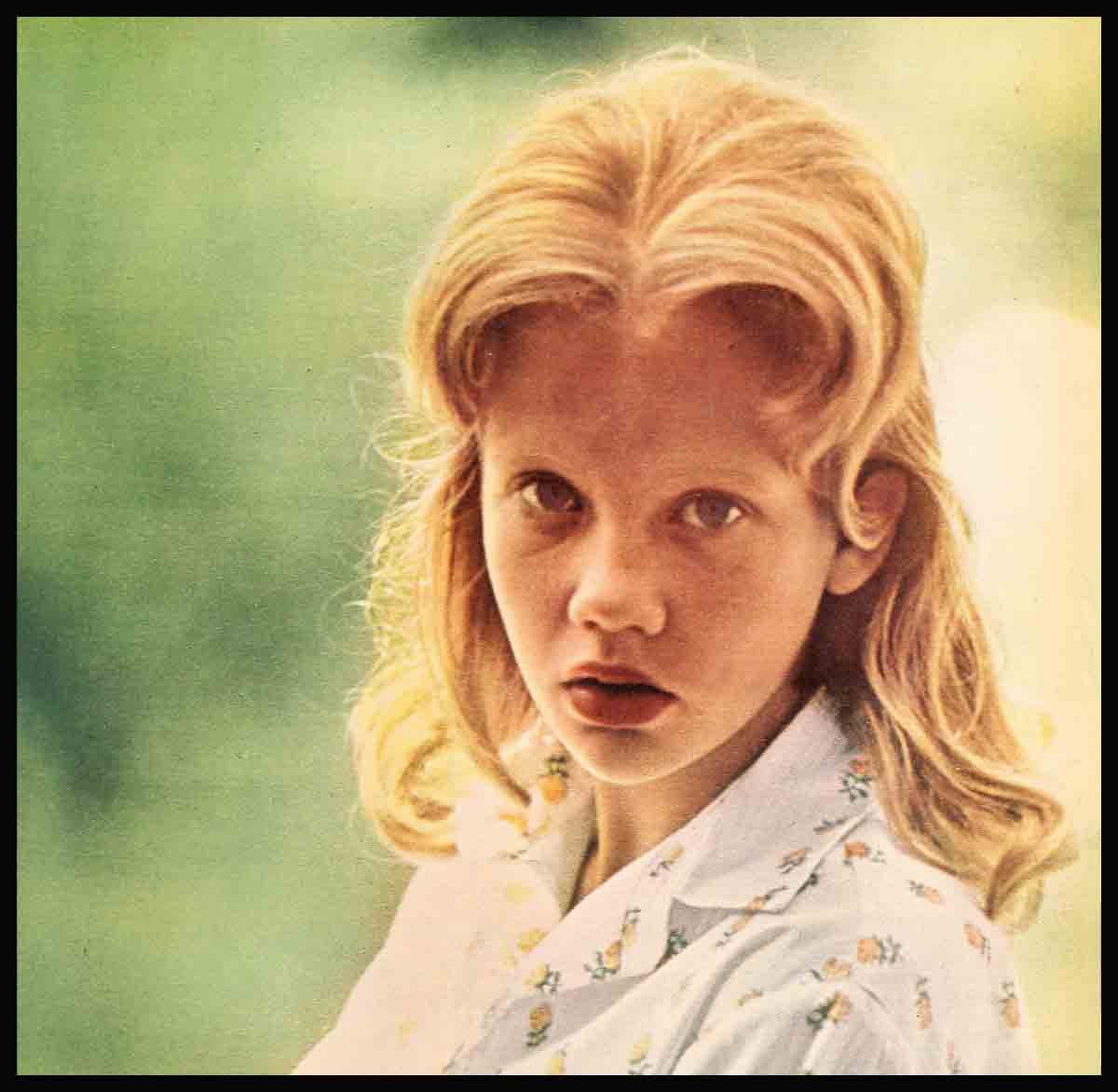
vorbelutr ioperbir
6 Temmuz 2023It’s hard to search out educated folks on this topic, but you sound like you know what you’re speaking about! Thanks